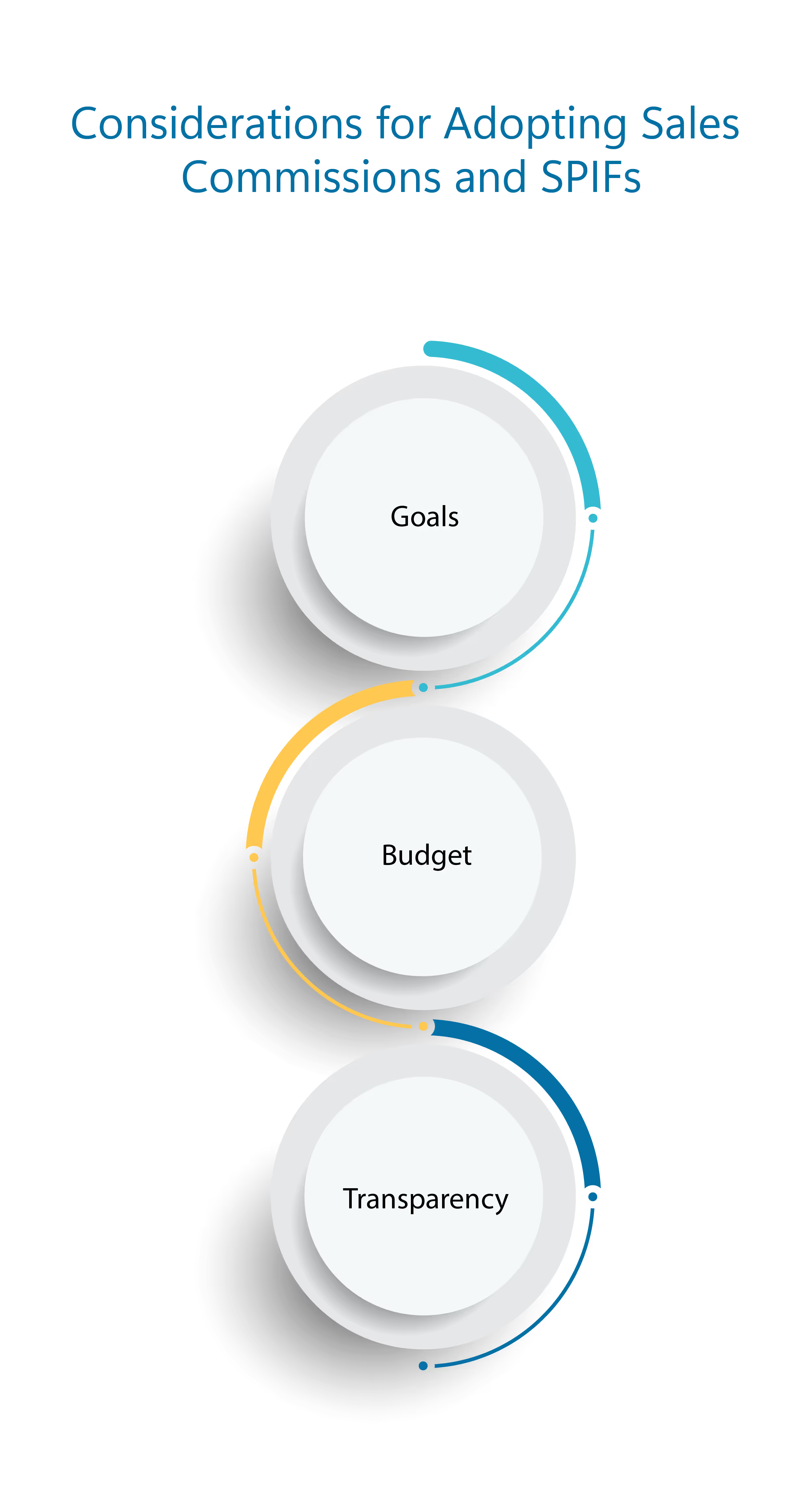
Blog
Considerations for Adopting Sales Commissions and SPIFs
August 29, 2022


Key Insights
As a business owner, you are aware of the significance of sales success and desire to maintain a full sales funnel. And if your goal for the year is to fill it with more green numbers, you need salespeople who can hit their target. One fantastic way to motivate salespeople to do this is by giving them performance-based incentives.
SPIFs and sales commissions are both sales performance incentives typically used in larger organizations. Both SPIF, or Sales Performance Incentive Fund, and sales commissions may be highly powerful instruments for motivating sales performance, even though they serve different objectives. With strategic implementation and effective sales performance management, businesses can strike the right balance between SPIFs and commissions, creating a dynamic incentive structure that optimizes sales efforts, boosts employee morale, and drives overall revenue growth.
We'll talk about each and then look for some of the best considerations that can be adopted for sales commissions and SPIFs in this article.
In one of the previous article we have also spoke about the pros and cons of each in detail. Do read it out for better understanding.

Sales Commission
A sales representative's overall salary may include a sales commission as an incentive to encourage them and raise performance. Reps often get a base salary as well as a variable compensation element in the form of sales commissions, which can be efficiently calculated and managed through the use of a sales commission tool.
For instance, you may give a sales representative a $500 basic wage plus a commission of 10% of all sales they generate throughout the month.
Remember that there are many more implementations of sales commission-based pay arrangements; this is only one simple example. For instance, paying representatives simply a commission and not a basic wage is one of them. Others include variable commissions, where the rate of commission varies depending on quotas, draws against commission, and more.
The time frame used to create quotas and assess representatives' performance against these quotas may also be changed. You may, for instance, set quotas on a monthly, quarterly, or other basis. The compensation structure you select will ultimately rely on the particular demands and requirements of your business, the items you sell, your sales cycles, and the objectives you wish to achieve.

SPIF
SPIF stands for the Sales Performance Incentive Fund.
In contrast to sales commissions, SPIF programmes are a temporary sales incentive that you provide to your salespeople when they meet specific predetermined objectives or goals. These SPIFs often come in the form of prepaid cards that your representatives may use to make purchases offline, online, or via ATMs. They can also take the shape of many kinds of rewards, such as gifts, trips, days off, and the like.
SPIF programmes are typically used to accomplish short-term objectives. This might range from improving a product's sales to growing income over time to boosting sales during product debuts.
Considerations for Adopting Sales Commissions and SPIFs
When using sales commissions and SPIFs, make sure they are appropriately created and put into practice for the greatest outcomes. There are several things you'll need to think about in order to guarantee that they are.
Goals

Your goals are one of the most crucial factors to take into account when adopting sales commissions or SPIFs. Therefore, you must identify what you want to accomplish because this will serve as the foundation for your strategy and execution. Additionally, if you don't have clear objectives, your execution will be haphazard, and the outcomes will be poor.
Your objectives may also influence the approach you should take. For instance, SPIFs are concerned primarily with short-term profits, as was already established. So, if you have short-term objectives that you want to accomplish, SPIFs will be the best strategy.
Likewise, sales commission is the best tool if your goal is long-term, sustainable growth. However, keep in mind that you may combine the two to produce a powerful sales plan, incorporating tools like a sales battlecard template.
Budget

The second factor to take into account is whether you have the financial resources to put one of these ideas into action. This is simply due to the fact that putting these techniques into place may be expensive, and bad budget planning may prevent your reps from receiving the incentives they are due, which will make them unhappy, lower their morale, and perform poorly.
Your budget should ideally be large enough to compensate all of your salespeople if they fulfil their quotas or objectives when arranging sales commissions or SPIFs. In other words, you should be okay with the fact that all of your reps will get the entire incentive or reward.
Transparency

Being entirely transparent is a critical factor to keep in mind while adopting SPIFs or sales incentives. This implies that your sales representatives need to be well aware of the incentive's mechanics as well as the requirements and potential rewards.\
This openness removes any ambiguity and guarantees that each and every one of your salespeople is aware of exactly what is expected of them. Additionally, as was already indicated, their motivation and performance will rise if they know exactly how much they will be paid.
The conclusion
You need the appropriate sales strategies when you want to boost sales, whether temporarily or in order to guarantee long-term growth. SPIFs and sales commissions are very useful instruments in this situation. You should be aware of their benefits and when it will be suitable to utilize them, though. This article should have made these points clearer by now.
Contact Kennect to find out more about sales commissions, additional incentives, and how to manage sales compensation more easily.
Our IC management software simplifies the tedious process of managing commissions and saves you time that you might use to operate your company.
ReKennect : Stay ahead of the curve!
Subscribe to our bi-weekly newsletter packed with latest trends and insights on incentives.
Thank you! Your submission has been received!
Oops! Something went wrong while submitting the form.
Your data is in safe hands. Check out our Privacy policy for more info















